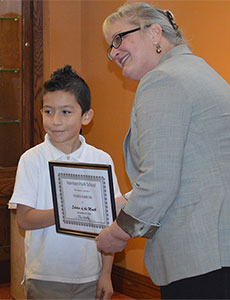There’s a lot of positive energy emanating from Grand Rapids’ West Side and many say at least some of it is because of the Grand Rapids Public School’s Challenge Scholars program.
Backed by a $32 million commitment from the Grand Rapids Community Foundation, the program kicked off in 2011 by providing students at Harrison Park and Westwood Middle schools with math and literacy coaches along with career guidance counselors to make college a real possibility. It promises to pay college tuition after all other options are exhausted for students who sign a pledge to graduate from high school on time and seek a college degree or vocational certification.
With incentives like that, West Side leaders say the program has drawn a healthy influx of new residents and stirred new energy and excitement. Nola Steketee, executive director of the West Grand Neighborhood Organization, attributed at least part of what’s happening in her neighborhood to the Challenge Scholars program.
Steketee said property values are slowly rising again and young families have discovered affordable housing, especially around Harrison Park. She added the West Side business community is using the prospect of a college education as a selling point.
“We’re finding more young families moving here and it’s for this reason, the promise of higher education for their children,” Steketee said. “The business community is talking about Challenge Scholars because it’s not only great for these students it’s great for the whole community.”

A good reason to stay
John Brann, president of the West Leonard Business Association, said Challenge Scholars is giving young families a reason to stay or move into Grand Rapids. He said as a member of the neighborhood organization and West Side Corridor Improvement Authority, he’s heard firsthand how important such educational opportunities are to creating healthy communities.
“It gives families and people a great reason to move into the city or stay in the city considering they have the option to go to college at no cost,” Brann said. “I can tell from the input I’ve received from being on all three of those boards that we are getting more involvement from younger people who are more excited about the West Side.
“What it comes down to is that there are a lot of great homes and neighborhoods on the West Side but if there aren’t good schools people are less likely to consider it as an option,” Brann added. “People always consider what’s best for their children first, and now they’re making the West Side one of their top considerations.”
Keeping an eye on success
West Side development is all well and good, but some, like The Other Way Ministries, worry the neighborhood’s recent growth could price some out of the neighborhood.
“The interesting dynamic with Challenge Scholars is that the (Grand Rapids Community) foundation set aside that money for people who are economically disadvantaged or on the bubble and we need to make sure those people can stay here if they want,” said Kurt Reppart, the group’s executive director. “We’re definitely excited about the developments but also concerned with making sure there’s an equal effort to secure affordable housing in the neighborhood. To me, the real success of Challenge Scholars is strengthening and providing hope for the people who already live here.”
Cris Kutzli is the Grand Rapids Community Foundation’s youth and education program director. As a coordinator of Challenge Scholars, she said her organization is keeping an eye on the neighborhood for that very reason. She noted the foundation chose to support its initiative on the West Side because some 89 percent of the students at Harrison Park, Westwood, and Union are considered economically disadvantaged.
“I wouldn’t necessarily attribute all of the positive changes happening on the West Side to Challenge Scholars, but we certainly know we’re part of it and have been surprised at how quickly the landscape there is changing,” Kutzli said. “The program was designed to provide support and resources for students and families who didn’t have the opportunity to go to college or college just wasn’t part of their vision.”
It’s all good for the kids
Aside from what’s happening in the neighborhood, those actually running the program see every day how it’s changing young lives for the better. Gwen Heatley, school career/college pathways coordinator at Harrison Park, said much of the program’s success is in helping kids understand that success is doing what you love.
“A career is a job that offers you benefits beyond a paycheck, like a sense of satisfaction and college is what helps you get that career,” Heatley said. “Loving what you do everyday leads to a healthier and happier life.
“Some of our parents used to look at higher education as something that’s available only to others,” Heatley added. “This is not only working, it’s changing lives and I see evidence of that every single day, every time I see parents with their kids interacting with one of the higher education representatives their faces light up when they understand the opportunities they now have.”
CONNECT









